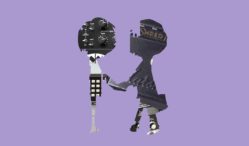

- Ok computer radiohead timeless how to#
- Ok computer radiohead timeless movie#
- Ok computer radiohead timeless android#
- Ok computer radiohead timeless series#
This morbid ballad was written for Baz Luhrrnann’s 1996 movie Romeo + Juliet. “It’s got this incredibly dense and terrifying sound to it,” Yorke said of Davis’s album. The singer conceived the song while listening to Miles Davis’s unnerving jazz-fusion masterpiece Bitches Brew in his car. Here, Yorke’s stressed narrator (the song was originally called Uptight) fantasises about being abducted. Recorded during the initial album sessions in rural Oxfordshire in early 1996, this rippling, Dylan-misquoting song mocked the millennial obsession with UFOs, as popularised by The X-Files, and recalled a school essay assignment to imagine how Oxford might appear to a recently arrived extraterrestrial. “The bleakest things can be said with jokes.”
Ok computer radiohead timeless android#
“What liberates Paranoid Android is a sense of humour,” said Yorke. “Everywhere, the place is about to go like that.” Lest we forget, it’s named after a character from The Hitchhiker’s Guide To The Galaxy. “America is at the point where the Roman Empire was just before it collapsed," he said ominously. The “kicking, squealing Gucci little piggy” was a cocaine-crazed woman Yorke Saw in a Los Angeles bar, while the theme of imperial collapse came from a friend in New York and Philip K Dick’s sci-fi novel VALIS. Paranoid Android is a collage of threats, pleas, fantasies, nightmares and snatches of dialogue.
Ok computer radiohead timeless series#
He filled a series of notebooks with fragmentary thoughts, observations and images that he called “Polaroids in my head". A lot of was that approach.” Needing a less personal lyric- writing strategy after The Bends, Yorke remember his time at Exeter University, when he produced an art show based on photocopies of his sketchbooks. “I like the way Lennon reports that song as a witness.

“This changing quickly, quite violent mood swings,” enthused Yorke. Phil Selway’s electronically manipulated drums and Colin Greenwood‘s stop-start bass homaged the fidgety loops of DJ Shadow, while Ed O’Brien’s monstrous, slow-moving guitar riff was designed to sound “like a car accident".Ĭonfronted with six-and-half-minutes of music constructed from four separate units (its original live incarnation was over 10 minutes), many listeners to OK Cornputer’s first single thought of Bohemian Rhapsody, but a more revealing touchstone was The Beatle’s A Day In The Life. One kind of technology kills another saves. Yorke’s mortal dread (“Every time I get in my car I have to say to myself that I might never get out again,” he admitted) is offset by stunned wonder. Like Lucky, another rare moment of ascendance, Airbag is about emerging from a near-death experience feeling superhuman, and establishes OK Computer’s ambivalence towards the modern world. Song by song: the music, movies, books, ideas and life experiences that helped make Radiohead’s OK Computer the Q readers’ greatest album of the last 25 years. As Thom Yorke sings on Paranoid Android, “Please could you stop the noise, I’m trying to get some rest.”. It came out just as the internet, globalization and 24-hour news were reshaping the way people consumed information, and spoke to people who felt both fascinated and overwhelmed by the process. Radiohead’s third album was blessed (or maybe cursed) with capturing a cultural mood.
Ok computer radiohead timeless how to#
KEY TRACK: How To Disappear Completely 01. Yet for all its complete lack of compromise, Kid A packs a mighty and timeless punch, be it on the lavishly layered How To Disappear Completely, the title track’s distorted electronica or Optimistic, the closest Kid A actually came to conventional pop song. That the same album entered the British and American charts at Number 1 continues to raise a smile. Kid AĮven now, the bravery of following 1997’s all-conquering OK Computer with what was effectively a Krautrock album with added beats and lyrical paranoia still staggers. Ultimately, In Rainbows was the sound of Thom York falling back in love with the song. The sonic innovation remained intact, but the glorious melodies had returned as heard in the soaring beauty of Nude, the spiraling surrealism of Weird Fishes/Arpeggi and the brooding House of Cards. No matter whether you paid pounds, pennies or absolutely nothing for the album on its initial digital release via Radiohead’s website (or waited for the physical versions), In Rainbows quickly revealed itself to be the band’s most tune-friendly release since OK Computer.


 0 kommentar(er)
0 kommentar(er)
